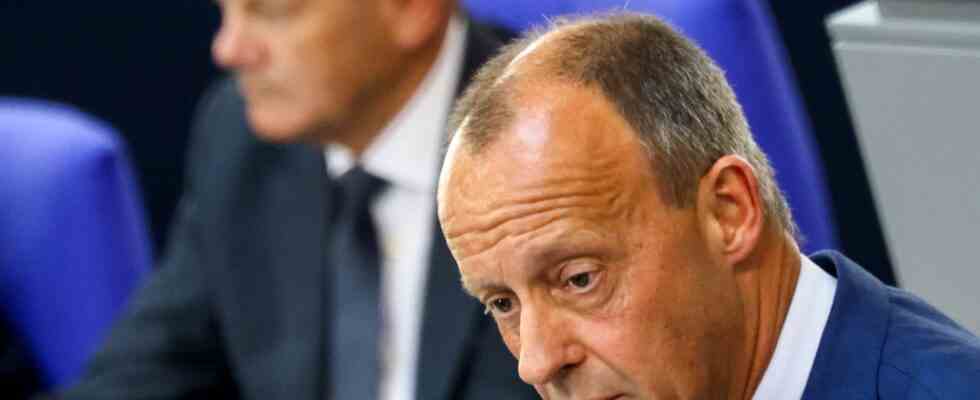analysis
Status: 10.11.2022 06:46 a.m
Friedrich Merz actually wanted to be a “constructive” leader of the opposition. But the relationship with the federal government has not only been more than cold since the dispute over citizen income. The Union relies on attacks.
How often might Friedrich Merz have thought of Franz Müntefering in the past year? Unforgettable his saying: “Opposition is crap.” Merz experienced this himself many years ago, but is experiencing opposition work again these days.
Opposition is of course important. Merz fulfills the role of opposition leader outstandingly: The almost two-meter man has led the Union to the government on an equal footing. No debate goes past him, at least not a significant one – and anyone who observes Merz quickly realizes that he wants to get out of this “crap” as quickly as possible. If the traffic light coalition were to collapse, he says, the Union would be ready to take over immediately.
Citizens’ money comes at just the right time
Now it doesn’t look like the traffic light will change, but the Union is attacking. Citizens’ money comes at just the right time. The Union can block the prestige project of the SPD via the Federal Council and get involved from the unpopular opposition role. Even more: Merz wants to ensure that the coalition drops the basic income, at least for the time being, processes it according to his wishes and only increases the standard rates for Hartz Vier.
Merz wants to set the tone, govern through the back door. The fact that he and his Union do not take the facts so seriously in the debate has little to do with constructive opposition work – and that’s exactly what Merz was committed to. In a speech in his home town of Arnsberg in March, he defined: “Being a constructive opposition means criticizing the government where necessary, confronting it with alternatives where possible, but also helping it in difficult situations to secure the country govern.”
The “Must-Way Opposition”
That was shortly after the start of the Russian invasion of Ukraine – and Merz had promised Olaf Scholz support at the time. Together they passed the 100 billion euro special fund for the Bundeswehr and anchored it in the Basic Law. After that, however, there was also a political turning point: Merz increasingly complained that Scholz was not including him. The already supercooled ratio has meanwhile reached the freezing point.
And that is also reflected in the opposition work of the Union: A highlight so far is the dispute over the gas levy. Economics Minister Robert Habeck exploded in the Bundestag and insulted the CDU and CSU as “must-go opposition”. He accuses her of being destructive and not honest.
Later it was about the “double boom” – 200 billion euros to relieve companies and citizens of the high energy costs. In other words, what the Union itself had demanded. Nevertheless, she voted “no” almost unanimously in the Bundestag. She doesn’t want to issue a blank check and first of all wants to know what exactly all the money is going to be spent on.
That is quite legitimate, the opposition is supposed to control the government. And later, when it comes to spending money, she can always be constructive and agree. After all, the situation is difficult, especially for the most vulnerable in society.
But it’s hard to believe in that anymore. The resolve to “help the government in difficult situations” appears to have had a very short half-life. The Union is definitely getting involved with its own proposals: it called for a gas price cap as early as late summer and continues to push for more nuclear power – knowing that this issue can split the coalition.
Confrontational rather than constructive
The tone between the coalition and the Union is now rowdy. SPD chairman Lars Klingbeil first calls Merz a “nagging uncle” and then accuses him of Trumpism in the debate about citizen income. The Greens still resent Merz for his behavior in voting on compulsory vaccination. The factions had approved the vote, Merz not – so the project failed. They murmur in Green circles that he, the leader of the opposition, is unreliable. And even in the FDP, they are not on good terms with the Merz-CDU, which is mutual.
In this mood, constructive support for the traffic light government by the Union hardly seems possible. The approach is confrontational rather than constructive. This could delay the citizen benefit. Merz cannot really expect the government to overturn its own plan and implement its plans – that would be tantamount to a declaration of political bankruptcy. A power game from which those who are particularly dependent on support suffer, of all people.

